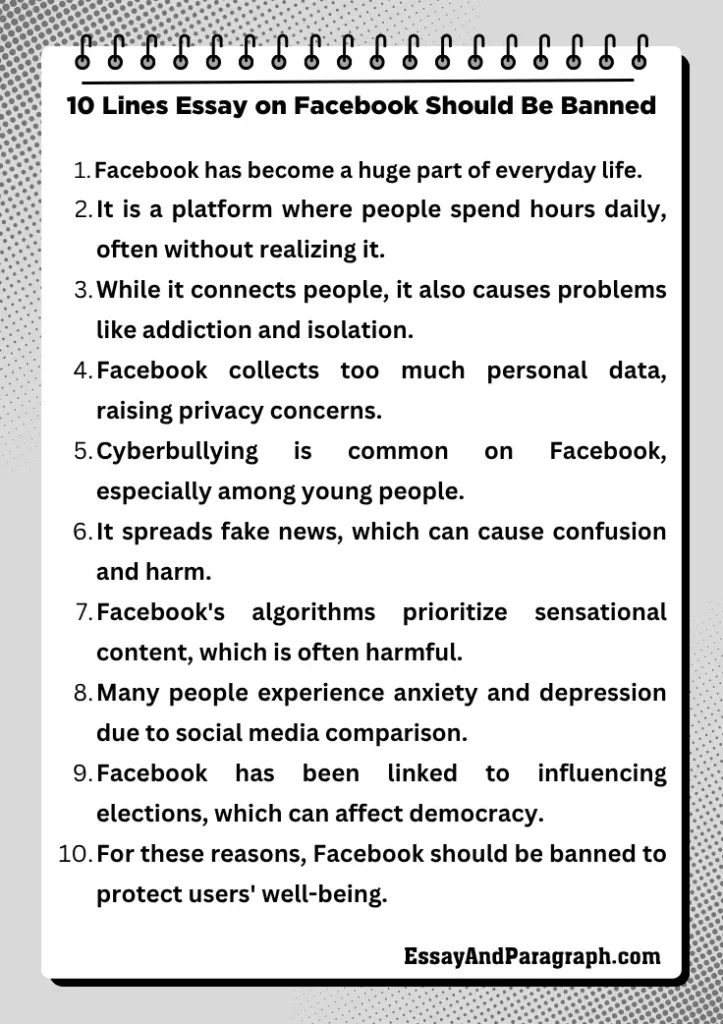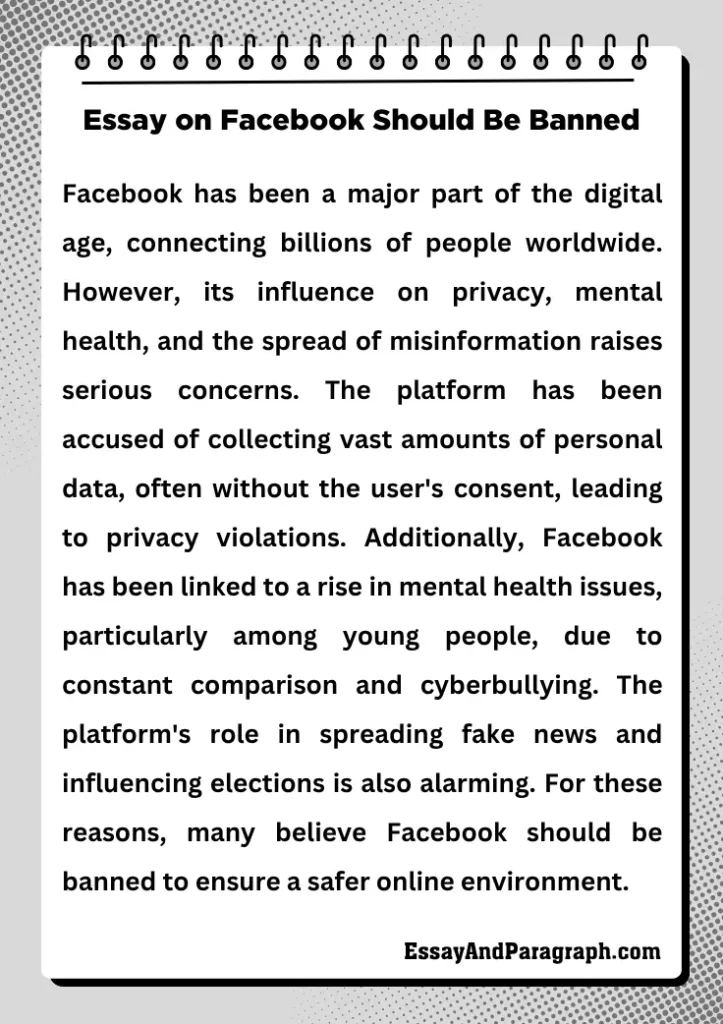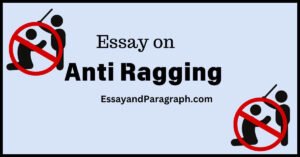Ever wondered how social media impacts our lives? Well, Facebook, one of the most popular platforms, has been under scrutiny for some time now. Many people argue that Facebook should be banned due to its negative effects on mental health, privacy, and society as a whole. In this article, we will explore the reasons why Facebook should be banned and discuss its consequences.
10 Lines Essay on Facebook Should Be Banned
Facebook has become a huge part of everyday life.
It is a platform where people spend hours daily, often without realizing it.
While it connects people, it also causes problems like addiction and isolation.
Facebook collects too much personal data, raising privacy concerns.
Cyberbullying is common on Facebook, especially among young people.
It spreads fake news, which can cause confusion and harm.
Facebook’s algorithms prioritize sensational content, which is often harmful.
Many people experience anxiety and depression due to social media comparison.
Facebook has been linked to influencing elections, which can affect democracy.
For these reasons, Facebook should be banned to protect users’ well-being.

Essay on Facebook Should Be Banned – 100 Words
Facebook has become one of the largest social media platforms, but its impact on society raises serious concerns. Many argue that Facebook should be banned due to its negative influence on mental health, privacy issues, and its role in spreading misinformation. The platform often promotes addictive behavior, leading users to spend excessive amounts of time scrolling, which can contribute to isolation. Additionally, Facebook’s privacy violations and the harmful effects of cyberbullying are significant reasons why it should be banned. To ensure a safer online space, banning Facebook could be a step toward better protecting users from these harmful consequences.
Essay on Facebook Should Be Banned – 150 Words
Facebook has become a central part of modern life, but it brings significant issues with it. One of the most concerning problems is privacy. The platform collects vast amounts of personal data, which can be misused or sold to third-party companies. This invasion of privacy is a major reason why Facebook should be banned. Additionally, Facebook has a negative impact on mental health. The constant comparison to others on the platform can lead to feelings of inadequacy and anxiety, especially among younger users. Research has shown that excessive use of Facebook contributes to social isolation and depression. Another issue is the spread of misinformation. Facebook’s algorithm prioritizes sensational content, much of which is false or misleading. This has led to confusion and even political manipulation, affecting the way people think and vote. For these reasons, many argue that Facebook should be banned to protect users’ privacy, mental health, and society as a whole.
Essay on Facebook Should Be Banned – 200 Words
Facebook is one of the most popular social media platforms, but it has been widely criticized for various negative impacts. The biggest concern is privacy. Facebook collects a vast amount of personal data, including user activity, preferences, and location, which can be sold to third-party companies or misused. This data collection without proper consent puts users at risk and raises serious ethical concerns. In addition to privacy issues, Facebook contributes to a decline in mental health, particularly among teenagers. The platform encourages constant comparison, which can lead to feelings of insecurity, anxiety, and depression. Many users, especially young people, suffer from the pressure to appear perfect, which negatively affects their self-esteem and social lives.
Furthermore, Facebook plays a significant role in spreading misinformation. Its algorithm amplifies sensational and false content, which often results in confusion and widespread false beliefs. This misinformation has been linked to influencing political outcomes and public health crises. Additionally, Facebook has become a breeding ground for cyberbullying, especially for vulnerable users. Given these factors, banning Facebook could be a necessary step to protect user privacy, improve mental health, and reduce the spread of harmful content. The platform’s negative impact on society outweighs its benefits, making it a risky environment for users.
Short Essay on Facebook Should Be Banned – 250 Words
Facebook has been an essential part of social interaction for many years. However, the platform has faced serious criticism for various reasons. One major issue is privacy violations. Facebook collects and shares vast amounts of personal data, putting users at risk. The Cambridge Analytica scandal is a prime example of how Facebook’s data misuse can affect millions of people.
Moreover, Facebook has contributed to the rise of mental health issues, especially among teenagers. The constant comparison with others can lead to feelings of inadequacy, anxiety, and depression. Research has shown that Facebook’s algorithms amplify sensational content, making users more likely to engage with harmful or misleading posts. This contributes to a culture of misinformation, where fake news spreads quickly.
Another alarming concern is the platform’s role in promoting cyberbullying. Many young users are victims of online harassment, and Facebook’s limited efforts to control this issue have been criticized.
Lastly, Facebook has been used to influence political outcomes, raising concerns about the platform’s role in affecting democracy. Given these issues, many believe Facebook should be banned to protect users’ privacy, mental health, and societal well-being.
Long Essay on Facebook Should Be Banned – 500 Words
Facebook, once hailed as a revolutionary platform for connecting people around the world, has increasingly become a subject of criticism. Its influence on modern society cannot be ignored, but many believe that its detrimental effects outweigh the benefits, making the argument for banning Facebook stronger than ever. The platform’s negative impact on privacy, mental health, and the spread of misinformation highlights the urgent need for action.
One of the primary concerns is Facebook’s abuse of user data. The social media giant collects an alarming amount of personal information from its users, which is often sold to third-party advertisers. This data harvesting has raised significant privacy concerns, particularly following the infamous Cambridge Analytica scandal. As a result, users’ personal lives are being exploited for profit, leaving them vulnerable to various security threats.
Moreover, Facebook’s effect on mental health cannot be overstated. The platform encourages users to constantly compare themselves with others, fostering feelings of inadequacy and low self-esteem. Research shows that excessive use of Facebook can lead to depression, anxiety, and social isolation, especially among teenagers. In fact, a study conducted by the Royal Society for Public Health in the UK found that Facebook, along with Instagram, is one of the worst platforms for mental health.
Another reason why Facebook should be banned is its role in the spread of misinformation. The platform’s algorithm prioritizes sensational and often false content, leading to widespread misinformation. This has had serious consequences, including influencing elections and fostering political divisions. False claims about COVID-19 and other important issues have been widely circulated, putting public health and safety at risk.
In addition to these issues, Facebook has also been criticized for its failure to address cyberbullying. Although the platform has made some attempts to tackle online harassment, its efforts have often fallen short. Many young users continue to be targeted by bullies, and Facebook’s inadequate response only perpetuates the problem.
Finally, Facebook has been used as a tool for political manipulation. During the 2016 U.S. Presidential Election, Facebook ads were used to spread misinformation and influence voters. This raised serious concerns about the role of social media in undermining democracy. Facebook’s lack of accountability in this regard has led many to believe that the platform has too much power over public opinion.
In conclusion, Facebook’s harmful effects on privacy, mental health, and society as a whole make it a platform that should be banned. While it has the potential to connect people, the negative consequences far outweigh the benefits. A world without Facebook could lead to a safer, more mindful, and healthier online environment.
FAQs
1. Why should Facebook be banned?
Facebook should be banned because it has numerous negative effects, including the violation of privacy, the spread of misinformation, and its impact on mental health. Studies have shown that Facebook can contribute to feelings of anxiety, depression, and social isolation, especially among teenagers. The platform also collects massive amounts of personal data, which raises concerns about security. Additionally, the platform’s role in the spread of fake news and political manipulation has had serious consequences.
2. What impact does Facebook have on mental health?
Facebook’s impact on mental health is significant. The platform encourages users to compare themselves with others, which can lead to feelings of inadequacy and low self-esteem. Research has shown that excessive use of Facebook can contribute to anxiety, depression, and social isolation. The constant bombardment of idealized images and status updates creates unrealistic expectations, which can negatively affect users, especially younger people.
3. Is Facebook responsible for the spread of misinformation?
Yes, Facebook plays a major role in spreading misinformation. The platform’s algorithm tends to prioritize sensational content, which often includes false or misleading information. This has been a major concern, especially during events like elections or crises like the COVID-19 pandemic. Misinformation on Facebook can have serious consequences, influencing public opinion, creating panic, and even affecting global health and safety.
4. How does Facebook affect privacy?
Facebook has been criticized for its data collection practices, which often invade users’ privacy. The platform collects extensive information about its users, including personal details, browsing habits, and location data. This information is then used for targeted advertising and, in some cases, sold to third-party companies. The lack of transparency in Facebook’s data practices has raised serious concerns about user privacy.
5. How can Facebook influence elections?
Facebook has been used as a tool for political manipulation, especially in the case of the 2016 U.S. Presidential Election. Ads and posts were strategically targeted to influence voters’ opinions. The platform also facilitated the spread of fake news, which swayed public perception. This has raised concerns about the role social media plays in undermining democracy and whether platforms like Facebook should be held accountable for their influence on elections.
Top 5 Quotes on Facebook Should Be Banned
“Facebook is a tool that has connected the world, but it has also disconnected us from real human relationships.” – Unknown
“The more Facebook takes, the less we have for ourselves.” – Unknown
“When you give away your privacy for free, you pay a heavy price for it.” – Unknown
“Social media should be a tool for positive change, but Facebook too often spreads negativity and misinformation.” – Unknown
“In a world where privacy is compromised, Facebook is leading the charge in undermining our personal space.” – Unknown

Summary
Facebook has been a major part of the digital age, connecting billions of people worldwide. However, its influence on privacy, mental health, and the spread of misinformation raises serious concerns. The platform has been accused of collecting vast amounts of personal data, often without the user’s consent, leading to privacy violations. Additionally, Facebook has been linked to a rise in mental health issues, particularly among young people, due to constant comparison and cyberbullying. The platform’s role in spreading fake news and influencing elections is also alarming. For these reasons, many believe Facebook should be banned to ensure a safer online environment.










